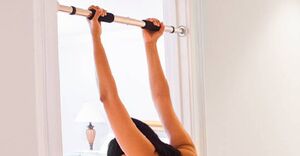
Home vs. Commercial Dumbbells: 5 Key Differences to Find Your Best Fitness Partner
Are you in the market for a new set of dumbbells but unsure whether to go for home or commercial ones? Look no further! In this comprehensive comparison, we will explore the differences and similarities between home and commercial dumbbells.
From size and weight to material and durability, we’ll cover it all. We’ll also discuss which option is better for home workouts and commercial gyms, considering factors such as cost, space, and maintenance. So, whether you’re a fitness enthusiast or a gym owner, finding your best fitness partner starts here.
What Are Dumbbells?
Dumbbells are essential fitness equipment used for various exercises, providing individuals with the means to incorporate resistance and weight training into their workout routines.
Dumbbells are versatile tools that can target specific muscle groups, improve overall strength, and increase muscle mass. They allow individuals to perform a wide range of exercises, such as bicep curls, shoulder presses, chest flies, and lunges, for a dynamic and varied workout.
Incorporating dumbbells into a fitness routine can also help improve stability, coordination, and balance, making them a valuable asset for both beginners and advanced fitness enthusiasts.
What Are the Differences Between Home and Commercial Dumbbells?
When comparing home and commercial dumbbells, notable differences arise in terms of quality, durability, and suitability for different usage scenarios.
Home dumbbells are typically designed for personal use and tend to be smaller in size, with a focus on convenience and affordability.
On the other hand, commercial dumbbells are crafted to withstand heavy, frequent use, often in gym or fitness center settings, leading to a higher quality build and increased durability. This disparity in construction means that commercial dumbbells offer superior performance and longevity, making them the preferred choice for intensive, professional environments.
Size and Weight
One of the key distinctions between home and commercial dumbbells lies in their size, weight, and the convenience they offer for different workout settings.
Home dumbbells are designed to be lightweight and compact, making them easy to store in small spaces and convenient for home workouts.
On the other hand, commercial dumbbells are often larger and heavier, providing a robust and durable option suitable for high-traffic gym environments.
The portable nature of home dumbbells allows for flexibility in choosing workout locations, while the sturdiness of commercial dumbbells ensures their longevity and ability to withstand heavy use.
Material and Durability
Another factor that sets home and commercial dumbbells apart is the material used and the resulting differences in durability and strength, impacting their long-term performance.
Commercial dumbbells are often constructed from higher-grade materials such as stainless steel or iron. This provides exceptional durability and strength, making them ideal for commercial settings where they endure frequent, heavy use.
In contrast, home dumbbells may use lower-grade materials like plastic or coated concrete. These materials may not withstand the rigors of regular use over an extended period of time. The structural disparities between the two types of dumbbells significantly affect their overall longevity and performance, making commercial options a more reliable investment for long-term use.
Adjustability
The adjustability of dumbbells is another area where home and commercial options differ, influencing their versatility and suitability for varying workout regimens.
Home dumbbells typically offer a more limited range of weight adjustments, often requiring manual changes between sets, while commercial dumbbells often feature convenient selector pin systems or quick-adjust mechanisms.
This disparity translates into the ability to seamlessly transition between exercises and intensity levels during workouts with commercial dumbbells, ultimately enhancing the overall exercise experience. The flexibility and customization provided by commercial dumbbells allow for a broader range of exercises and targeted muscle engagement, supporting a more diverse and comprehensive training regimen.
What Are the Similarities Between Home and Commercial Dumbbells?
While home and commercial dumbbells have notable differences, they also share commonalities in terms of the types available and the exercises that can be effectively performed using both variants.
Both home and commercial dumbbells come in a range of types, including adjustable, fixed-weight, and selectorized options. This allows users to choose based on their preferences and workout requirements.
These dumbbells are versatile and can be used for common exercises such as bicep curls, tricep extensions, shoulder presses, and chest presses. They are suitable for individuals of varying fitness levels, making them an effective tool for strength training workouts.
Types of Dumbbells
Both home and commercial dumbbells encompass various types, offering users versatility in their exercise routines and accommodating different training preferences.
When it comes to dumbbells, there are various options available. These include traditional fixed-weight dumbbells, as well as adjustable ones that allow for gradual increases in resistance.
Another type is selectorized dumbbells, which make it easy to change the weight with a simple dial or pin selection. These are great for circuit training or quick transitions between exercises.
Additionally, some dumbbells have ergonomic designs, hexagonal shapes, or rubber coatings. These features add comfort, safety, and protection for both the user and the floor.
Exercises That Can Be Done
Home and commercial dumbbells facilitate an array of exercises that target various muscle groups, enabling comprehensive strength training and muscle toning for users.
Dumbbells are incredibly versatile and can be used for a variety of exercises such as bicep curls, tricep kickbacks, shoulder presses, chest presses, and squats. This makes them a great option for a full-body workout.
One of the benefits of using dumbbells is their adjustable weights, which allow for progressive resistance. This means that as you get stronger, you can increase the weight to continue challenging your muscles and promoting growth.
Whether you prefer to workout at home or in the gym, dumbbells are a valuable tool for customizing your workouts to your individual fitness level and goals. They are an essential component of any strength training regimen.
Which Is Better for Home Workouts: Home or Commercial Dumbbells?
When considering home workouts, the choice between home and commercial dumbbells depends on factors such as cost, space availability, and the convenience they offer for individual fitness needs.
For many fitness enthusiasts, the cost-effectiveness of home dumbbells may appeal due to their one-time investment, while commercial options can offer a wider range of weight variations and durability.
Space utilization also plays a crucial role, as home dumbbells might take up less space, making them suitable for smaller workout areas. The convenience of having the right set of dumbbells at home can motivate individuals to stay consistent with their fitness routine, supporting their overall health and well-being.
Cost
The cost factor plays a crucial role in determining the suitability of home or commercial dumbbells for home workouts. Budget considerations often influence the purchase decision of individuals.
When it comes to purchasing dumbbells, there are two main options: commercial and home dumbbells. Commercial dumbbells are usually more expensive upfront, but they are built to withstand heavy and frequent use, making them a worthwhile investment for serious fitness enthusiasts.
On the other hand, home dumbbells may be more affordable initially, but they may not be as durable or of the same quality as commercial-grade equipment. It’s important for individuals to consider their budget, how often they will be using the dumbbells, and their long-term fitness goals before making a decision.
Space and Storage
Space availability and storage requirements are significant determinants in selecting suitable dumbbells for home workouts. This is especially important when considering the adjustable and space-efficient features of different options.
For home environments, many people look for compact and adjustable dumbbells that can be easily stored in small spaces. On the other hand, for commercial use, dumbbells need to be able to withstand frequent usage and may require larger storage spaces.
One popular option for home workouts is adjustable dumbbells, which offer practicality by replacing multiple traditional dumbbells. They provide convenience and versatility in limited spaces, making them a great choice for those with specific needs and preferences.
By understanding these factors, individuals can make informed choices when it comes to selecting the right dumbbells for their fitness routine.
Personalization and Versatility
The personalization and versatility offered by home and commercial dumbbells contribute significantly to their suitability for individual workout preferences and the diverse needs of users.
When it comes to choosing between home and commercial dumbbells for home workouts, it’s important to consider the customizable nature of these fitness tools.
Home dumbbells provide the convenience of adjusting weights according to personal fitness levels, making them ideal for those who prefer tailored workout regimens.
On the other hand, commercial dumbbells offer a wider range of options, catering to diverse requirements and allowing users to adapt their workouts as they progress in their fitness journey.
Maintenance and Upkeep
Maintenance considerations and upkeep requirements are essential factors to consider when deciding between home and commercial dumbbells, as they directly affect the long-term quality and performance of the equipment.
Proper care can significantly impact the durability of the dumbbells, ensuring that they remain in optimal condition for extended periods. Regular cleaning, lubrication, and inspection of the handles and weights are crucial to prevent rusting and wear and tear.
For home workouts, individuals need to be particularly vigilant in maintaining their dumbbells as they are often exposed to varying environmental conditions. Commercial dumbbells, on the other hand, may require more comprehensive maintenance due to frequent use by multiple individuals, necessitating regular checks and upkeep to uphold their performance and safety standards.
Which Is Better for Commercial Gyms: Home or Commercial Dumbbells?
When it comes to commercial gyms, the choice between home and commercial dumbbells involves considerations such as cost, durability, variety, and their overall suitability for high-traffic gym environments.
Commercial gyms require equipment that can withstand heavy usage. When evaluating the suitability of dumbbells for such settings, gym owners must prioritize durability to ensure a long-lasting investment.
The variety of weight options available in commercial dumbbells can cater to a diverse clientele, making them a versatile choice for high-traffic gyms. Cost-effectiveness becomes crucial in the long run, as investing in durable, versatile dumbbells can lead to lower maintenance and replacement costs over time.
Cost
Cost considerations are pivotal in determining the choice between home and commercial dumbbells for commercial gyms. The investment and budgetary aspects play a crucial role in the decision-making process.
When opting for dumbbells, gym owners must carefully weigh the initial costs versus long-term benefits. While home dumbbells may seem more budget-friendly upfront, commercial-grade options offer durability and performance, ultimately reducing long-term replacement and maintenance expenses.
It’s essential for gym owners to assess their available funds, consider the projected usage and volume of clients, and evaluate the overall return on investment to make an informed decision that aligns with their financial objectives.
Durability and Longevity
The durability and longevity of dumbbells are critical factors for commercial gyms, with the material composition and long-term performance influencing the suitability of home or commercial options for high-traffic environments.
When it comes to selecting the right materials for high-traffic settings, it’s crucial to understand the wear and tear that dumbbells endure. Thankfully, manufacturers are constantly innovating to create durable options that can withstand heavy use. One popular choice for commercial gym dumbbells is stainless steel, known for its exceptional durability and resistance to corrosion. Additionally, rubber-coated dumbbells offer added protection against impact and reduce noise, making them a great option for busy fitness facilities.
Variety and Quality
The variety and quality offered by dumbbells play a vital role in determining their suitability for commercial gyms, with performance and exercise versatility influencing the choice between home and commercial options.
For gym owners, it’s crucial to consider durability, weight range, and grip options when selecting dumbbells. Commercial gyms need equipment that can withstand high usage, making durability a key factor.
A wide range of weight options and different grip styles allows for diverse exercise possibilities, catering to the varied needs of gym members. This emphasis on variety and quality ensures that the chosen dumbbells are versatile enough to accommodate a wide range of exercises and workouts.
Maintenance and Upkeep
Maintenance considerations and upkeep requirements are crucial for commercial gyms when selecting between home and commercial dumbbells, as they directly affect the long-term performance and user experience.
Proper maintenance not only ensures the longevity of the equipment but also plays a vital role in ensuring the safety of the users.
Neglecting regular upkeep can lead to issues such as loose plates, worn-out handles, and compromised weight distribution, posing risks to the users.
Consistent maintenance contributes to a smoother and more efficient workout experience, enhancing customer satisfaction and loyalty.
It also reflects positively on the gym’s overall image, demonstrating a commitment to providing quality equipment and a safe environment for patrons.




No Comments